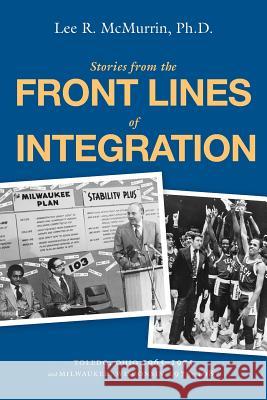Stories From the Front Lines of Integration: Toledo, Ohio 1965-1975 and Milwaukee, Wisconsin 1975-1987 » książka
Stories From the Front Lines of Integration: Toledo, Ohio 1965-1975 and Milwaukee, Wisconsin 1975-1987
ISBN-13: 9780692275894 / Angielski / Miękka / 2014 / 166 str.
Stories From the Front Lines of Integration: Toledo, Ohio 1965-1975 and Milwaukee, Wisconsin 1975-1987
ISBN-13: 9780692275894 / Angielski / Miękka / 2014 / 166 str.
(netto: 65,34 VAT: 5%)
Najniższa cena z 30 dni: 68,80
ok. 16-18 dni roboczych
Bez gwarancji dostawy przed świętami
Darmowa dostawa!
Nazis at school board meetings, teachers who refused to teach black children: these were just two of the many challenges Lee McMurrin faced during the turbulent years of court-ordered school integration. By employing a collaborative approach, Dr. McMurrin and his colleagues managed to keep the Toledo, Ohio public schools out of court. Upon becoming superintendent of the Milwaukee, Wisconsin public schools, his Toledo experience helped to inform his approach in a system that was already in federal court as a result of school segregation. Other major US cities, including Boston and Chicago, braced for violence as their schools were forcibly integrated. In Milwaukee, Dr. McMurrin introduced specialty and magnet schools, an innovative approach that gave families a choice in the schools their children attended. His visionary leadership included options to educate students for careers in solar energy and computer technology, even before these industries were mainstays of the economy. McMurrin also raised the level of expectations for Milwaukee students, providing the impetus for their first victories in both academic and athletic competitions. He obtained funding to upgrade inner city schools that had been neglected, and increased pride in their communities. While the voluntary approach to school integration was not without its critics and obstacles, McMurrin found that most parents, both black and white, wanted the best education for their children, regardless of where the school was located. Stories From the Front Lines of Integration is both an important historical narrative and one that can inform today's educators and parents. The book concludes with recommendations for dealing with diverse constituencies, based on Dr. McMurrin's extensive experience and common sense solutions. This book offers an insider's view of the integration of two of America's major metropolitan school systems, and the tactics that helped to, ultimately, keep the peace and satisfy the federal court's mandate.
Nazis at school board meetings, teachers who refused to teach black children: these were just two of the many challenges Lee McMurrin faced during the turbulent years of court-ordered school integration. By employing a collaborative approach, Dr. McMurrin and his colleagues managed to keep the Toledo, Ohio public schools out of court. Upon becoming superintendent of the Milwaukee, Wisconsin public schools, his Toledo experience helped to inform his approach in a system that was already in federal court as a result of school segregation. Other major US cities, including Boston and Chicago, braced for violence as their schools were forcibly integrated. In Milwaukee, Dr. McMurrin introduced specialty and magnet schools, an innovative approach that gave families a choice in the schools their children attended. His visionary leadership included options to educate students for careers in solar energy and computer technology, even before these industries were mainstays of the economy. McMurrin also raised the level of expectations for Milwaukee students, providing the impetus for their first victories in both academic and athletic competitions. He obtained funding to upgrade inner city schools that had been neglected, and increased pride in their communities. While the voluntary approach to school integration was not without its critics and obstacles, McMurrin found that most parents, both black and white, wanted the best education for their children, regardless of where the school was located. Stories From the Front Lines of Integration is both an important historical narrative and one that can inform todays educators and parents. The book concludes with recommendations for dealing with diverse constituencies, based on Dr. McMurrins extensive experience and common sense solutions. This book offers an insiders view of the integration of two of Americas major metropolitan school systems, and the tactics that helped to, ultimately, keep the peace and satisfy the federal courts mandate.











